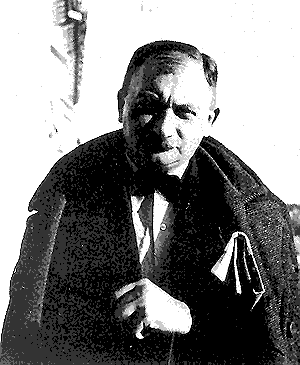Joseph Roth Online
A SITE DEDICATED TO THE WORK OF THE AUSTRIAN JOURNALIST AND NOVELIST JOSEPH ROTH (1894-1939)
'Nasty, Drunk and Clever'? An Introduction
'Das bin ich wirklich - böse, besoffen, aber gescheit.' (Roth, 1938)
Joseph Roth remains little
known outside the German-speaking countries, despite being amongst the
most prolific and talented writers of the twentieth century. He is best
remembered for two novels recreating, respectively, the shtetl
of the Eastern Jews (Hiob or Job, 1930), and the vanished
world of the Habsburg monarchy (Radetzkymarsch or The Radetzky
March, 1932). However, Roth was one of the best-known and highest
paid journalists in the Weimar Republic, whose articles and Feuilletons
about Berlin, Paris, Russia and other places seemed to capture the energy
and ambivalence of the Zeitgeist, a culture dazzled by competing
ideologies, new technologies, and a burgeoning entertainment industry.
His novels from the 1920s, the most famous of which is Die Flucht ohne
Ende (Flight without End, 1927), portray a damaged generation
of young men and women as vividly as those of Hemingway or Fitzgerald.
Further, his life was in many ways an extraordinary one. Roth was born to German-speaking Jewish parents in fin-de-siècle Austria-Hungary, close to the border with Russia. Though he is often thought of as an archetypally 'Austrian' writer, his place of birth, Brody, was located many hundreds of miles away from Vienna. Today it is part of the Ukraine. Roth grew up in a diverse community, in which Jews and gentiles, German, Polish, Yiddish and Ukrainian speakers, and soldiers, farmers and tradespeople lived cheek by jowl. The sense of loss he felt with the disappearance of this community, which could not survive the collapse of empire, was to mark Roth profoundly. His work frequently revolves around the feeling of being literally and metaphorically homeless.
Roth, in his journalism and in his fiction, looked to greater values than the merely political or pragmatic. The parochialism of German and Austrian society, and their intolerance of difference, depressed him deeply. In his work he sought to celebrate and defend our common humanity, drawing on his provincial childhood, his Jewishness, the experience of war, revolution and social upheaval, and the restless, hotel-dwelling lifestyle of a cosmpolitan journalist.
Ultimately, as with so many
of his co-religionists and fellow liberals, Roth was forced into exile,
which he spent for the most part in Paris, a city he loved. His final
years were characterised by financial troubles, acute alcoholism, and
an increasingly eccentric political stance (despite the socialist attitude
of his early years, he favoured the re-establishment of the Habsburg empire).
Yet he continued to write until the last, and was a tireless and vocal
opponent of Hitler's regimes and its supporters. His final work, Die
Legende vom heiligen Trinker (The Legend of the Holy Drinker,
1939), is amongst his finest. The tale of an alcoholic seeking redemption
by repaying a loan reflects both Roth's ambiguous spirituality, and his
belief in the necessity of justice, of balancing the scales.
Recently Joseph Roth's novels have been made available again in English
translation (published by Granta Books and Peter Owen). It is to be hoped
that this marks the beginning of a renewed international interest in his
work. This site is intended as a small contribution to this process. I
would welcome feedback and comments, either in an e-mail to me, or in
the guestbook.
This website is entirely the work of Jon Hughes, who takes all responsibility for its content.
My e-mail: jon.hughes@rhul.ac.uk
Visitors since July 2000:
